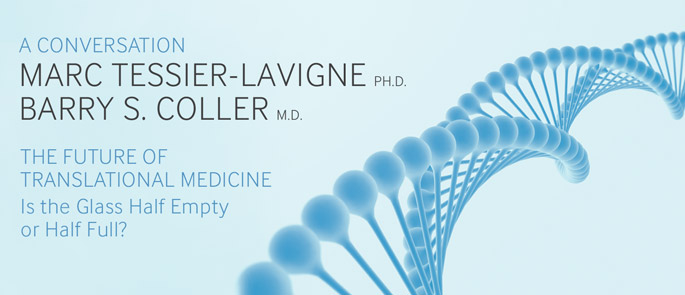
REGISTER NOW THURSDAY, MAY 28, 2015
RECEPTION 6:00 – 6:30 P.M.
LECTURE 6:30 – 7:30 P.M.
Abby Aldrich Rockefeller Hall, 1230 York Avenue at 66th Street
A CONVERSATION
MARC TESSIER-LAVIGNE, PH.D.
President and Carson Family Professor
Laboratory of Brain Development and Repair
BARRY S. COLLER, M.D.
Vice President for Medical Affairs and Physician-in-Chief
David Rockefeller Professor
Allen and Frances Adler Laboratory of Blood and Vascular Biology
WE ARE IN THE MIDST OF A TECHNOLOGY-FUELED ERA OF BIOMEDICAL DISCOVERY that has generated stunning clinical breakthroughs, including drugs that can send some malignancies into remission and daily pills that can clear life-threatening infection by the hepatitis C virus. The current pharmaceutical pipeline is set to deliver new classes of cholesterol-lowering medications, innovative therapies for metastatic melanoma, and other promising treatment options.
Even with these successes, however, there is widespread frustration about the current rate of progress in medical science's battles against many illnesses, including Alzheimer's disease, resistant bacterial infections, malaria and other global diseases, and some common forms of cancer. Patients ask why it still takes so many years to bring a new prescription drug to market, despite large investments in strategies designed to accelerate the translation of laboratory discoveries into novel treatments.
These are the kinds of problems that concerned Marc Tessier-Lavigne during his career as a biotech executive, and they are still very much on his mind in his current role as president of The Rockefeller University. Before coming to the University in 2011, Dr. Tessier-Lavigne was the executive vice president of research and chief scientific officer at Genentech, and prior to that he was on the faculty of the University of California, San Francisco, and Stanford University. For this evening program, Dr. Tessier-Lavigne will be interviewed by Rockefeller's Barry Coller, the University's vice president for medical affairs and physician-in-chief. Dr. Coller has extensive experience in drug discovery. His studies of platelet physiology and thrombosis led to the development of a drug that is now widely used to reduce complications of coronary artery angioplasty, and he has also devised a test to monitor the effects of aspirin and other anti-platelet therapies in individual patients.
Dr. Coller and Dr. Tessier-Lavigne will discuss the opportunities and challenges in drug discovery today. They will also consider the role of academic science in developing novel therapies, focusing on translational research efforts at The Rockefeller University Hospital, as well as new programs that are helping Rockefeller investigators pursue clinical applications of their work. Please join us as we explore the future of medicine in an age of economical genome sequencing, computer-assisted drug design, and sensitive diagnostic tools that produce information we have just begun to learn how to use.
Please contact Emma Stevens with questions at estevens@rockefeller.edu or (212) 327- 8675.